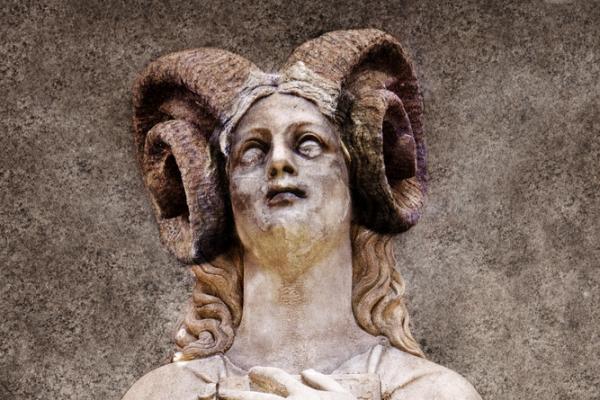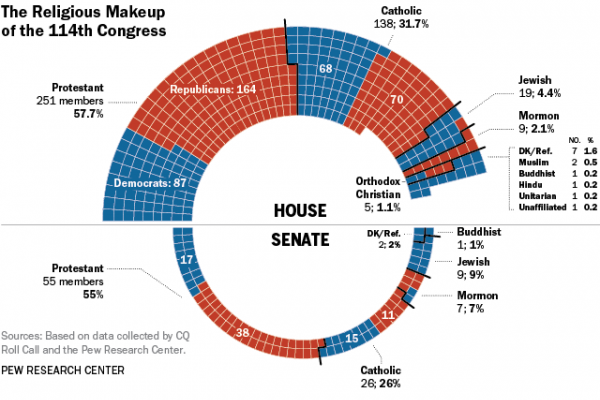Ten years after Massachusetts became the first state to allow same-sex marriage, gay and lesbian Americans can be wed in 35 states and the District of Columbia (Florida will boost that number to 36, starting Jan. 6). This year, the Supreme Court may put an end to the skirmish by legalizing what progressives call “equality” and conservatives dub a “redefinition” of this cherished social institution.
The court last ruled on gay marriage in 2013 when the justices gutted much of the federal Defense of Marriage Act in United States v. Windsor and delivered a massive blow to anti-gay marriage advocates. Since then, the court has acted by not acting — in effect, doubling the number of states where gay marriage is legal, from 17 to 35, by refusing to hear a slew of appeals last year.
In November, the Cincinnati-based 6th U.S. Circuit Court of Appeals upheld gay marriage bans in four states, which will almost certainly require the high court to decide the issue once and for all.
Conservative Christians have been among the most ardent opponents of gay marriage and rights for decades. How will they respond if the Supreme Court makes gay marriage legal nationwide?
The answer, it turns out, depends on which Christian you’re speaking to.
Oklahoma may seem an unlikely place for what has been called a satanic sculpture to be installed on government property. In fact, there may be no better place for it.
Considered by many to be the buckle in the proverbial Bible Belt, the statehouse in Oklahoma City has boasted a sculpture of the Ten Commandments, paid for by Oklahoma State Representative Mike Ritze, for some time. Actually, the statue is in the process of being rebuilt after a man who heard voices in his head urinated on the monument and then crashed into it with his car.
Perhaps most interesting is the legal groundwork laid to allow such a religious statue to be placed on public property. To avoid church/state separation issues, the property on which the statue was placed was declared as a monument park, and Ritze donated the piece. Finally, Ritze claimed protection under the First Amendment as a basis for a religious icon being on government grounds.
But they set legal precedent for other groups, like the Church of Satan, to do the same thing. They have actually agreed to halt plans for the installation if Ritze and his supporters will not replace the destroyed Ten Commandments statue. At this point, Ritze intends to proceed, while also fighting the placement of the other piece.
There are at least three important factors to consider including:
1) The First Amendment applies to thing we don’t like.
Republicans will take full control of Capitol Hill when the 114th Congress is sworn in on Jan. 6, but even with a political shift, there will be little change in the overall religious makeup of Congress, according to a new analysis from the Pew Research Center.
Here are seven ways the religious makeup of Congress will (and won’t) change.
1) More than nine-in-10 members of the House and Senate (92 precent) are Christian; about 57 percent are Protestant while 31 percent are Catholic. The new Congress will include at least seven members who are ordained ministers.
2) Protestants and Catholics continue to be over-represented as members of Congress than other Americans. As of 2013, 49 percent of American adults are Protestant, and 22 percent are Catholic, according to a new Pew Research Center analysis.
3) The biggest difference between Congress and other Americans is the number of people who say they are religiously unaffiliated. Just 0.2 percent of Congress say they are religiously unaffiliated, compared with 20 percent of the general public. In fact, the only member of Congress who publicly identifies herself as religiously unaffiliated is sophomore Rep. Kyrsten Sinema, D-Ariz.
It's that time of the year again, when we stand on the precipice of a new year and look forward to what is in store for us in 2015. Last year, I wrote 14 Things the Church Needs to Do in 2014, and many of them are still true for 2015. However, given the events of 2014, the church now also has a monumental opportunity to provide healing, justice, care, and compassion in new and exciting ways — ways I believe are important for the church in the upcoming year.
Pope Francis reinforced his radical reshaping of the Catholic Church by naming 20 new cardinals from countries as far afield as Ethiopia, Tonga, Thailand, and Panama.
The clerics – who come from 18 different countries – include 15 who are eligible to vote for the pope’s successor in a future conclave, and five retired bishops and archbishops “distinguished for their pastoral charity” who are over age 80 and ineligible to select the next pontiff.
Dissatisfied with the slow pace of change in Rome, Francis’ appointments reflect his desire for “pastors on the front line of difficult situations,” one Vatican observer said, who can bring a new perspective from the often overlooked outposts of global Christianity.
The Vatican’s chief spokesman, the Rev. Federico Lombardi, said the choices showed the pope’s most important criteria was “universality,” and indicated he was not “chained to tradition” as he moves the balance of power at the highest levels of the church closer to the developing world.
It is the first time ever that cardinals have been selected from Tonga, Myanmar, and Cape Verde to become “princes of the church.” There are only five Europeans included among the 15 new electors – two from Italy and three others from Corsica, Spain, and Portugal. The United States was shut out for the second time in a row.
Here is one of 2014’s most enduring tips for budding filmmakers: Do not make films that are going to make developing countries angry.
First, North Korea went ballistic over “The Interview,” which contained a farcical plot to assassinate Kim Jong Un. And then, Egypt, Morocco, and the United Arab Emirates decided to ban the new Ridley Scott biblical epic, “Exodus: Gods And Kings.”
Why? Egypt, in particular, is angry at the film’s historical inaccuracies. “Exodus” shows the ancient Egyptians hanging recalcitrant Hebrew slaves; hanging was never used as a punishment in ancient Egypt. Moreover, the Egyptians are upset because the film depicts the ancient Hebrews laboring on the Great Sphinx and the pyramids. They also object to the depiction of an armed Hebrew insurrection, which does not appear in the ancient biblical text.
The official statement claimed the film includes “intentional gross historical fallacies that offend Egypt and its pharaonic ancient history in yet another attempt to Judaize Egyptian civilization, which confirms the international Zionist fingerprints all over the film.”
Guess what? The Egyptians are right.
Pope Francis nominated 15 new cardinals Jan. 4 from 14 different nations but leaving several leading U.S. archbishops off the list.
Speaking to a crowd gathered in St. Peter’s Square, the pontiff named each cardinal, noting they came from every continent and “show the indelible tie with the church of Rome to churches in the world.” At least three are from nations that have never had a church member in the role.
Five of the cardinals come from Europe, three from Asia, three from Latin America, and two each from Africa and Oceania.
The nations of Cape Verde, Tonga, and Myanmar received their first cardinals ever, Vatican spokesman Fr. Federico Lombardi said in a statement.
In 2002, at a time when insurance providers were unwilling to provide coverage for losses resulting from acts of terrorism, and when construction and utility companies were stalling in their development projects, Congress passed the Terrorism Risk Insurance Act (TRIA). They decided to socialize some of the financial risk, giving a federal government guarantee on insurance payouts exceeding 100 million dollars.
Over the next 12 years, Presidents Bush and Obama and six different Congresses made countless decisions to increase the risk of terrorism (and of a bailout under TRIA). Of course, the most brutally profound effects of those decisions were imposed on children, women, and men in other parts of the world. Likely the least affected people were the ones complaining in the business sections of major papers last month.
They are worried because TRIA expired January 1. An unexpected fluke on the last day of the last congressional session is to blame. “Everybody expected this would get done,” fumed Manhattan developer Douglas Durst, to New York Times reporter Jonathan Weisman.
He won’t be waiting all that long — House Speaker John Boehner promised the Baltimore Sun to “act very quickly” to renew TRIA when Congress reconvenes.
1. Here Is What Happens When Each Myers-Briggs Personality Type Makes A New Year’s Resolution
These may or may not be scarily accurate...
2. The Birth of a New Civil Rights Movement
“The shattering events of 2014, beginning with Michael Brown’s death in Ferguson, Missouri, in August, did more than touch off a national debate about police behavior, criminal justice and widening inequality in America. In 2014, the new social justice movement became a force that the political mainstream had to reckon with.”
3. 10 Resolutions for 2015
“We often only use the word in the context of this season, but “resolution” is a nuanced noun. Some of its definitions include: A firm decision to do or not to do something; the quality of being determined or resolute; the action of solving a problem, dispute, or contentious matter. In a world of seemingly endless conflicts, I sure like the sound of that. We need more of all of these qualities just now in this brand new year.”
4. The Tragedy of the American Military
“The American public and its political leadership will do anything for the military except take it seriously. The result is a chickenhawk nation in which careless spending and strategic folly combine to lure America into endless wars it can’t win.”
Sometimes a smiley-face emoticon just won’t do the trick.
In Myanmar, the newest set of Facebook stickers features a flower in an animated character’s mouth. The 24 stickers carry a deeper message than the usual “Like” thumbs-up Facebook icon: “End hate speech with flower speech.”
The stickers are the latest attempt to combat the spread of “dangerous speech” online and are sponsored by Panzagar, a coalition of civil society activists. The group’s name, which means “flower speech,” was organized as a response to the pervasiveness of anti-Muslim invective online and in public space.
At the same time and with less fanfare, Facebook is rolling out a new process for users to report online abuse in Myanmar. Since November 21, Facebook users in the country have new options available to report disturbing posts. The new process is aimed at more quickly addressing complaints and removing offensive posts in the Myanmar language.
This type of “market-specific reporting mechanism” already exists in some regions, including North Africa. Facebook’s grievance process was originally developed in the U.S. in response to teen cyberbullying.








